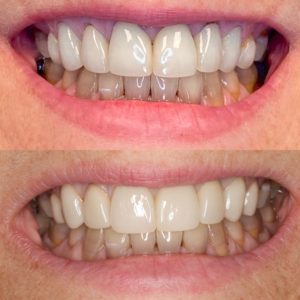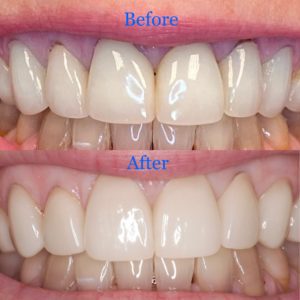If you have a worn, chipped, or cracked tooth, you likely need a dental crown. Also called dental caps or teeth caps, dental crowns are used to strengthen teeth, improving their function and overall esthetics. We offer dental crown treatment as a part of our restorative dentistry treatments we offer to the public in Media, PA.

What Can Crowns Treat?
Because of their versatility, crowns:
- Protect a tooth weakened by decay or damage
- Prevent chipped or broken teeth from breaking apart
- Restore teeth that are severely worn down
- Replace an existing restoration that covers more than half of the tooth
- Reinforce a tooth after root canal therapy
- Cover and support a tooth with a large dental filling
- Support a dental bridge
- Cover misshaped or severely discolored teeth

Before And After Treatment
Receiving a Dental Crown in Media, PA
Regardless of which treatment you choose, you will receive a comprehensive consultation and examination. During this visit, we will inspect your teeth, gums, and mouth and determine if porcelain dental crowns are right for you. Next, will map out a customized treatment plan to meet your cosmetic goals as well as address your health concerns.
We will begin treatment by preparing the tooth for a dental crown. This may involve removing old fillings or dental crowns to provide a stable foundation for the new crown. will take an impression of your tooth that will be sent to a dental laboratory where the permanent crown will be made. A temporary tooth cap is placed over the tooth for protection and esthetics.
The cap is made of plastic and temporarily sealed to the tooth. This is typically worn for 2 to 3 weeks while the permanent dental crown is being fabricated at the laboratory. When the dental crown arrives from the laboratory, will try it on to check the fit, shape, and color. We will make any minor adjustments that might be needed before permanently bonding the dental crown to the tooth.
Dental crowns require very little special care. will review instructions with you and show you how to floss and brush properly. Routine dental cleanings and examinations are important to ensure long-term health and proper fit.
The Benefits of Dental Crowns

Before and After Treatment
The versatility of dental crowns is what makes them stand out among other dental restorations. While they’re considered a restorative dental procedure, they can also take care of cosmetic issues. Whether you need something that strengthens your teeth or you want to cover a dental flaw, dental crowns can help you.
They’re probably the best method of strengthening your tooth. Dental crowns often allow people to keep their natural teeth instead of needing to get a full replacement. Even when the dental pulp has been removed due to an infection or a portion of the tooth is broken, a dental crown can restore full functionality to the tooth. In addition to saving the tooth, it also protects your ability to eat a normal diet and speak normally as well.
Because they cover the entire tooth, they’re great for cosmetic problems that other dental solutions may not be able to do. They can completely cover discoloration, even when the staining is severe. They can also cover any chips, cracks, blemishes, or flaws in your tooth, making it look new and perfectly blend in with your smile.
Lastly, dental crowns can help prevent any further problems that you may have with a misaligned bite. The pressure is able to be distributed equally throughout your teeth, which may not have been possible with the defect in your tooth. This prevents further chipping and cracking in other teeth. It can also help you avoid TMJ disorders that can develop with a misaligned bite.
Dental Crown FAQs
Learn more about dental crown treatment in Media, PA, with answers to these commonly asked questions:
Is a dental crown procedure painful?
A dental crown procedure should not be painful. Your dentist will use a local anesthetic to numb the area around the tooth during the procedure. However, you might experience some sensitivity or mild discomfort as the anesthetic wears off.
Discomfort is generally manageable with over-the-counter pain relievers. But if the discomfort persists or intensifies, you should contact your dentist for a follow-up.
What are the three types of dental crowns?
Porcelain, ceramic, and metal are the three primary types of dental crowns. Porcelain crowns offer a natural look and feel that is very durable and resistant to staining. Ceramic crowns look good aesthetically and can provide additional protection against fractures. Metal crowns are strong and long-lasting; however, they may not be as aesthetically pleasing as the other types of crowns.
Can you whiten dental crowns?
No, you can’t whiten dental crowns. Unlike natural teeth, crowns are made from materials like porcelain or ceramic, which don’t respond to whitening treatments. If a crown becomes stained or you want it to match your newly whitened teeth, the only option is to replace it with a new one matching your desired tooth color. Keep this in mind if you plan to whiten your teeth so that your crown still blends in nicely.
Can I eat normally with a dental crown?
Yes, you can eat normally with a dental crown. Once the crown is fully in place and your dentist has made sure it fits well, you should be able to chew and eat just like you would with your natural teeth. However, it’s a good idea to be careful with very hard or sticky foods, like nuts or caramel, as they can sometimes damage the crown. Otherwise, you can enjoy your favorite foods without any problems.
Can I get a filling instead of a crown?
Yes. A tooth filling can be an alternative to a tooth crown. Your dentist will use a tooth filling when the damage to the tooth is not significant enough to warrant the placement of a dental crown. However, if there is significant damage to the tooth or the cavity is too large, your dentist may recommend a tooth crown instead of a filling.
How long can you delay getting a crown?
You should not delay getting a dental crown if your dentist recommends it. In fact, you should not wait more than 2-3 months before receiving a dental crown. It is possible to delay the treatment for a few weeks, depending on the extent of the damage. However, if the decay or damage to your tooth is extensive, delaying the procedure may only make it worse.
Does insurance cover dental crowns?
Many insurance plans provide coverage for dental crowns. However, this is only if your plan includes coverage for restorative procedures. It is important to review the details of your plan. Insurance companies may also require pre-authorization before beginning treatment, so it is best to consult with your dentist beforehand if you need to.
How long do dental crowns last?
Dental crowns can last anywhere from five to fifteen years or more. The longevity of your dental crowns will depend on the type of crown material, the location of the crown in the mouth, oral hygiene, and habits such as grinding or clenching of teeth.
For example, porcelain crowns usually last longer than resin crowns because they are more resistant to wear and tear. Regular dental checkups and good oral hygiene can help prolong the lifespan of a dental crown.
Protect Your Teeth Today
Dr. Gregory Hillyard and Dr. Alexandra Monroe offer crowns as a restorative dental option to patients in their Media, PA dental office. Call 610.566.0291 to schedule an appointment to discuss your restorative needs and learn more about dental crowns.

